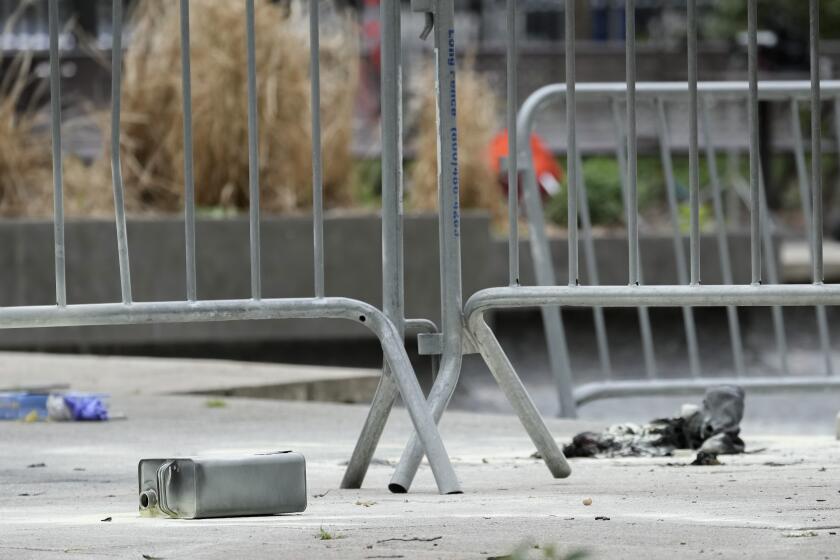Mandela’s message has faded in his homeland
The long public farewell to Nelson Mandela will end on Sunday. After 10 days celebrating his life and mourning his death, South Africans will bury their leader in his family’s village of grazing cows and one-room, tin-roofed shacks.
Mandela leaves behind a troubled nation, still struggling to deliver on his dream of equality and advancement. But his legacy transcends that.
His relentless battle against apartheid fueled a new strain of American activism among young people on college campuses who embraced a battle against injustice half a world away.
Students’ massive anti-apartheid protests in the ‘70s and ‘80s helped pressure South Africa into abandoning its white supremacist system that stripped blacks of citizenship and denied them basic rights.
The movement provided a heady lesson in the power of collective outrage. For many in my generation, it stoked a lifelong commitment to social service and broader civic engagement.
President Obama credits the issue with sparking his interest in politics. His introduction to social activism was leading a protest against apartheid as a student at Occidental College in Eagle Rock.
For others, the impact of those protests was less public, but no less profound.
“It was the kind of thing that changed my life,” said Gayla Cook-Mohajane, 64, who grew up in my neighborhood in Cleveland and graduated in 1971 from Cornell.
Now she hopes Mandela’s death will “push the needle” for this generation, as his life did for ours.
::
When Gayla Cook arrived at Cornell University in the late 1960s, the civil rights sit-ins were over and the anti-war movement was waning.
“The anti-apartheid movement, that was the thing on campus,” she said. Protests against South Africa were beginning to rev up. She joined demonstrations, arranged fundraisers and helped organize uprisings that would, years later, lead to thousands of arrests and symbolic shantytowns on campus.
“I’d been totally apolitical in Cleveland,” she said. But apartheid resonated with stories of discrimination she’d heard from her parents, who were both raised in the South. “The whole call for justice and equality. That’s what got me involved.”
That involvement sparked her curiosity about other countries in Africa. A white economics professor steered her to a summer internship in an Ethiopian village, where lepers roamed the streets and water wasn’t safe to drink.
She realized that for all the black nationalist sloganeering about “back to Africa” movements, most Americans knew little about the continent’s struggles and sorrows.
After earning a master’s degree, she began working with American groups on African development projects. She married a South African activist, who’d been banned from his country and lived in exile in the U.S.
In 1990 --six months after Mandela was released from 27 years in prison -- Cook-Mohajane moved with her husband and their three children from Washington, D.C., to South Africa. It was her husband’s first opportunity to go home in 15 years without facing house arrest.
It meant she would go from marching against apartheid to living under its rules.
“That was a very rough period, those four years between Mandela’s release and his election as president,” Cook-Mohajane said.
The nation was trying to remake itself in an era of tension and uncertainty, marred by dangerous tribal clashes and overt white resentment.
She and her husband could afford to live in an expensive home in a white neighborhood of Johannesburg, send their children to private schools and hire servants and drivers.
“But first we had to go to our neighbors on both sides, for them to sign an application saying that they didn’t mind living next to us, as black people,” Cook-Mohajane recalled.
“I remember thinking to myself, what have I done, what have I brought my children to. The country was on a razor’s edge. ... And it was mainly attributed to Mandela that it didn’t turn into a bloodbath.”
::
She watched the tributes to Mandela this week alone in a hotel room in Yemen, where she’s working on an international development project. The solitude gave her a chance to consider how far her adopted country has come and the imprint Mandela left on her.
“It’s the end of an era for South Africa and for me personally,” she said. “My story started with him walking out of prison.... Now he’s gone. These are the bookends for me.”
She remembers the euphoria of Mandela’s presidency, and the painful reality check provided by his successors:
“Independence, freedom, black governance.... Then a whole long period of things unfolding, people seeing that it was not as easy as one thought to transform a liberation movement into a well-functioning government.”
Class inequality would loom as large as racial differences and prove harder to resolve. Crime is rampant, public education substandard, corruption commonplace and unemployment stubbornly high.
“South Africa has not been able to deliver on the promises to the majority of people,” Cook-Mohajane said. “The idealism is gone.... The old guard is dying off.” And young people -- who grew up without the rallying issue of apartheid -- don’t seem ready to take the reins and move the country forward.
“Everyone wants to have a good life,” she said. “Everyone wants to have a good time. But there have to be people who care about the public good and are willing to sacrifice.”
Perhaps the celebration of Mandela’s life will teach them what change requires.
“It’s been amazing, in a way, to see how much Mandela meant to the rest of the world,” Cook-Mohajane said. “Maybe this is a good time for the young people to be reminded of that.
“They knew he was famous. They knew he was important. But I don’t think they knew how important he was. Or understood how some people had to have the good of the whole society as their priority.... In South Africa, we haven’t had that for a while.”
--
Twitter: @SandyBanksLAT
More to Read
Start your day right
Sign up for Essential California for news, features and recommendations from the L.A. Times and beyond in your inbox six days a week.
You may occasionally receive promotional content from the Los Angeles Times.






